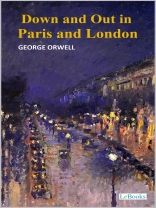globally known for his works: Animal Farm; 1984; Down and Out in Paris and London; Burmese Days; Keep the Aspidistra Flying, among others. Down and Out in Paris and London is a memoir of the most defining period of the author's life and his first work. It was upon its publication in 1933 that the pseudonym George Orwell was born, at the suggestion of his editor.
After working as a British Empire police officer in Burma, George Orwell decided to understand the life, ways, and thoughts of the poor population and went to live as one of them. Orwell lived in destitution for a long time before finding work as a dishwasher in a hotel, and all the experiences he had in both cities resulted in this precious book. In Down and Out in Paris and London, Orwell discusses his times living in poverty in such a realistic and moving way that it is impossible to put the book down before finishing it.
A propos de l’auteur
George Orwell, the pseudonym of Eric Arthur Blair, was born in 1903 in Bengal (India), the son of a British civil servant and a Frenchwoman. He moved to England in 1911 and attended a boarding school. From 1917 to 1921, he studied at Eton College, one of the most traditional English schools, where he was taught by the writer Aldous Huxley. In 1922, he declined a university scholarship and returned to India to work in the imperial police.
He returned to England in 1928. Living in poverty—reaching the point of beggary—he wandered through London and Paris until the mid-1930s. In 1933, he published his first book, Down and Out in Paris and London, and in 1934, Burmese Days. A socialist, he went to Spain in 1936 to fight in the International Brigades in support of the newly elected popular government. Homage to Catalonia (1938) narrates his experiences in the Spanish Civil War.
During World War II, Orwell worked as a war correspondent for the BBC. In 1945, he published Animal Farm, his most popular work. Another book known worldwide is his novel 1984 (1949). George Orwell died in 1950 in England.












